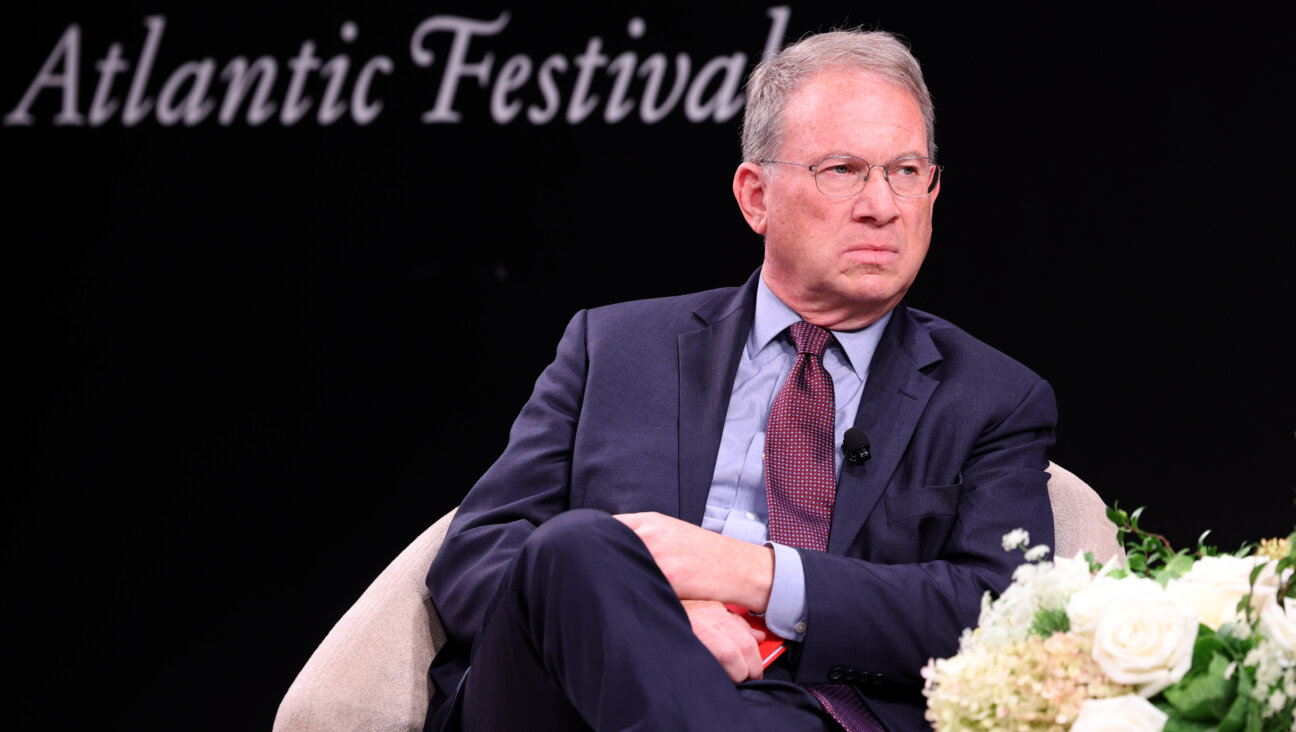Evangelical Group Cuts Off Donations to Jewish Agency
A group that directs evangelical Christian donations to Jewish causes has cut off funding to the Jewish Agency for Israel, imperiling a controversial partnership agreement that was signed only months ago.
At the beginning of this month, as the JTA first reported, the International Fellowship of Christians and Jews withheld a scheduled $1.5 million contribution to the Jewish Agency on the grounds that the Jewish Agency was not living up to a partnership agreement that the two organizations signed last December. IFCJ says it held the payment because the Jewish Agency — the massive, quasi-governmental organization that helped found the State of Israel — missed a due date for sending a marketing plan to publicize the new partnership.
The partnership in question has been the subject of controversy since it was announced last year. According to the agreement, IFCJ promised to give $45 million to the Jewish Agency over three years. The Jewish Agency, in turn, agreed to list IFCJ as a “strategic partner” and to give the organization’s founder and president, Rabbi Yechiel Eckstein, a seat on two of its most powerful governing committees.
The agreement provided a welcome infusion of funds for the cash-strapped Jewish Agency, which has been battered by declining core allocations from federations and the weakening dollar. The deal also raised eyebrows in the Jewish world, as some questioned the wisdom of giving such prominence to evangelical Christian donors at the Jewish Agency, which has historically been the link between Diaspora Jews and Israel.
But observers say that the latest controversy centers not on religion or ideology but on recognition. Some critics are charging that in its eagerness for attention, IFCJ has put its own interests ahead of those it is purporting to help.
“There’s a certain sense of arrogance about that,” said Abraham Foxman, national director of the Anti-Defamation League. “If Eckstein believed that the institution was of value because it is helping Jews, the fact that they didn’t fulfill a contractual obligation — do the needs of the Jews become any less?”
Eckstein and Jewish Agency representatives presented the latest rupture as a simple bureaucratic matter, borne of clerical errors. Eckstein says that the Jewish Agency missed a deadline for a marketing plan publicizing the new partnership, thus breaching the agreement. Both sides say that IFCJ now has the plan and is reviewing it, and that they hope the matter will be resolved soon.
“I think it’s a glitch, and the glitch is going to be worked out,” said Richard Pearlstone, chairman of the Jewish Agency’s board of governors. “I assume when it’s worked out, they’ll start paying again. And I don’t expect them to pay until it is worked out.”
But according to sources close to the federation system, the tensions between the Jewish Agency and IFCJ go deeper than a bureaucratic snafu. These sources said that the Jewish Agency has been caught in a battle between IFCJ and American federations ever since it struck the partnership agreement with Eckstein last year. Negotiated without consulting the federations that are the largest contributors to the Jewish Agency, the deal aroused the ire of large city federations, particularly in New York and Chicago. The federations were particularly incensed that IFCJ would be listed along with United Jewish Communities and Keren Hayesod, the respective umbrella groups for American and international federations, as a “strategic partner” of the Jewish Agency, despite the fact that some individual federations, such as those in New York and Chicago, allocate amounts similar to what IFCJ had promised.
Those same sources say that since then, Jewish Agency officials have attempted to pacify both sides, trying to simultaneously give Eckstein and IFCJ the recognition they were promised and allay the resentment of the restive federations. The marketing plan lies at the crux of that tension because it will, among other things, determine how prominently the Jewish Agency publicizes the partnership and whether it identifies IFCJ in places such as the organization’s letterhead.
Underlying the tensions between Eckstein and the federations is Eckstein’s own mixed reputation in the Jewish world. Since founding IFCJ 25 years ago, Eckstein has been a lightning rod both for being the first prominent Jewish figure to cultivate ties with evangelical Christians and for what critics charge is an excessive lust for the limelight. Eckstein has raised millions of dollars for a broad range of Jewish causes, and he has clashed with a number of Jewish organizations, including the Chicago federation. He also has had a turbulent history with the Jewish Agency, most pointedly a decade ago, when Avraham Burg, then head of the organization, refused to be photographed taking a check from Eckstein.
Eckstein’s practice of raising money from evangelical Christians for Israel and for other Jewish causes has become increasingly common in recent years, but it continues to arouse discomfort among Jews who argue that evangelicals don’t share a common set of values with Jews, and who point to resistance among many evangelical leaders to Israeli territorial concessions in the peace process.
Eckstein said he would not resume payments under the partnership until both sides reached an agreement on the marketing plan, which he described as a crucial measure of how seriously the Jewish Agency takes its relationship with Christian donors. He said he wants Jews and Jewish organizations “to see evangelical Christians who are supportive of Israel as not just niceties, not just as friends, but as strategic partners for Israel around the world.”
Viewed in that light, the cessation of payments is a relief for those who think that Israel should steer clear of such close ties with evangelical Christians.
“I feel more comfortable that the money has stopped,” said Colette Avital, a Knesset member from the Labor Party who chairs the Knesset committee charged with handling Diaspora affairs. “I don’t think the Jewish Agency should have engaged in a strategic plan to promote this partnership.”
The Forward is free to read, but it isn’t free to produce

I hope you appreciated this article. Before you go, I’d like to ask you to please support the Forward.
At a time when other newsrooms are closing or cutting back, the Forward has removed its paywall and invested additional resources to report on the ground from Israel and around the U.S. on the impact of the war, rising antisemitism and polarized discourse.
Readers like you make it all possible. We’ve started our Passover Fundraising Drive, and we need 1,800 readers like you to step up to support the Forward by April 21. Members of the Forward board are even matching the first 1,000 gifts, up to $70,000.
This is a great time to support independent Jewish journalism, because every dollar goes twice as far.
— Rachel Fishman Feddersen, Publisher and CEO
2X match on all Passover gifts!
Most Popular
- 1

Film & TV What Gal Gadot has said about the Israeli-Palestinian conflict
- 2

News A Jewish Republican and Muslim Democrat are suddenly in a tight race for a special seat in Congress
- 3

Fast Forward The NCAA men’s Final Four has 3 Jewish coaches
- 4

Culture How two Jewish names — Kohen and Mira — are dividing red and blue states
In Case You Missed It
-

Fast Forward Cornell pro-Palestinian student leader opts to leave US, as Columbia ‘self-deportee’ makes her case to return
-

Fast Forward ‘Need a final solution’: Podcast host calls for mass deportation of U.S. Jews
-

Fast Forward Britain’s Tate to return Nazi-looted painting to heirs of Jewish art collector
-

Fast Forward 3 sentenced to death for murder of UAE Chabad rabbi
-
Shop the Forward Store
100% of profits support our journalism
Republish This Story
Please read before republishing
We’re happy to make this story available to republish for free, unless it originated with JTA, Haaretz or another publication (as indicated on the article) and as long as you follow our guidelines.
You must comply with the following:
- Credit the Forward
- Retain our pixel
- Preserve our canonical link in Google search
- Add a noindex tag in Google search
See our full guidelines for more information, and this guide for detail about canonical URLs.
To republish, copy the HTML by clicking on the yellow button to the right; it includes our tracking pixel, all paragraph styles and hyperlinks, the author byline and credit to the Forward. It does not include images; to avoid copyright violations, you must add them manually, following our guidelines. Please email us at [email protected], subject line “republish,” with any questions or to let us know what stories you’re picking up.














